July 20, 2021 marks the fourth anniversary of the establishment of the Center for American Entrepreneurship (CAE), a nonpartisan research, policy, and advocacy organization whose mission is to work with U.S. policymakers to promote and support new business formation, survival, and growth. What a remarkable 48 months it has been.
For starters, we’ve survived, which is no small feat for any new organization, but especially for a research, policy, and advocacy organization – a unique organizational profile that doesn’t fit neatly into any of the standard categories that are easier to fund. We are profoundly grateful to our supporters – which include several foundations, the entrepreneurship-minded corporations that comprise our Corporate Advisory Council, and many generous individuals – for sharing our vision and believing in us.
Even more remarkable is what CAE has accomplished in just 48 months. It’s easy to forget the details, so we’ve collected into one easily reviewable place CAE’s major activities and accomplishments – with hotlinks to the underlying reports, documents, legislation, Op/Eds, and press releases – since we launched in July of 2017.
Two important points should be emphasized as context for the summary presented below. First, when CAE launched in July of 2017, entrepreneurship was all but absent from the policy radar screen in Washington, DC. There was no entrepreneurship-focused organization in town, no entrepreneurship caucuses on Capitol Hill, and only a few bills related to entrepreneurship had ever been introduced in Congress. Second, the summary below does not include the hundreds of meetings with policymakers and their staff conducted by CAE’s team, which is the hard, day-to-day blocking and tackling of trust-establishment and relationship-building that makes the achievements listed below possible.
Bob Litan – brilliant economist, entrepreneurship scholar, and true force of nature – served as CAE’s pre-launch chair and helped lay CAE’s intellectual and organizational foundations. Ian Hathaway, my friend, entrepreneurship scholar, co-author with CAE Advisory Council member Brad Feld of “The Startup Community Way” (the most important entrepreneurship-related book in decades), and current board member, co-founded CAE and was an invaluable influence and sounding board in the early days just before and just after CAE’s launch.
Sincere thanks to the members of CAE’s remarkable Advisory Council and Board of Directors for their time, energy, expertise, guidance, and support for what was, in July of 2017, more of an idea than an organization. No part of what follows could have been accomplished without all of them.
And very special thanks to our first two board chairs – Blake Patton, CAE’s first chair, and Rebecca Lovell, our current chair – for their leadership and critical contribution to CAE’s success to date.
Finally, my thanks to CAE’s day-to-day team that makes all we do happen: Al Simensky, Chris Walling, Kevin Ross, and, most especially, Katie Allen, my friend and partner in crime who took the personal and professional risk to launch CAE with me four years ago, has endured all the anxieties and uncertainties of this entrepreneurial venture, and has contributed importantly to everything CAE has accomplished.
Simply put, in our first 48 months underway, CAE has succeeded in raising entrepreneurship to the very highest levels of policymaking in Washington, DC, despite very challenging circumstances that have included funding challenges, historically intense political polarization, and a global pandemic.
With policymaker interest in entrepreneurship now clear, an Entrepreneurship Caucus established and active in both chambers of Congress, many significant pieces of legislation pending, and the urgent need to accelerate economic growth and job creation following the Covid-19 pandemic, CAE has an unprecedented opportunity to make progress on a wide range of issues critical to American entrepreneurs and startups as never before, with the aim of building a stronger, more resilient, and more inclusive U.S. economy.
To help us capitalize on that unique opportunity, CAE recently created the American Entrepreneurship Policy Coalition. After reviewing the summary of our activities and achievements below, I hope you’ll consider joining our efforts by becoming a member.
Research
- December 4, 2017: CAE releases “Immigrant Founders of the Fortune 500” by research director Ian Hathaway. The analysis shows that 43 percent of Fortune 500 companies were founded by a first- or second-generation immigrant, are headquartered in 68 cities in 32 states, and employ millions of Americans.
- February 5, 2018: CAE and the Brookings Institution releases “High Growth Firms and Cities in the United States,” an analysis of the defining characteristics of the Inc. 5000 (fastest growing) companies, 2011 to 2017, by research director Ian Hathaway.
- July 31, 2018: CAE releases “America’s Rising Startup Communities,” an analysis of the geographic distribution of first-round venture capital financing of early-stage startups by research director Ian Hathaway.
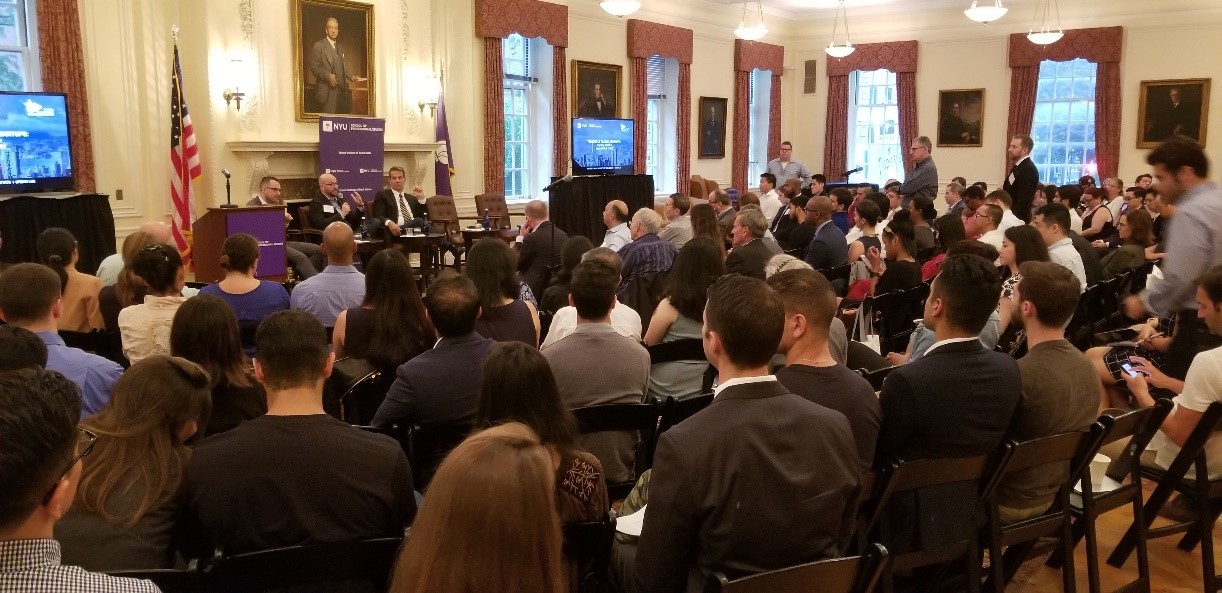 CAE co-founder and board member, Ian Hathaway, presents with co-author, economist Richard Florida, at NYU Law School regarding their report “The Rise of the Global Startup City: The New Map of Entrepreneurship and Venture Capital,” October 5, 2018.
CAE co-founder and board member, Ian Hathaway, presents with co-author, economist Richard Florida, at NYU Law School regarding their report “The Rise of the Global Startup City: The New Map of Entrepreneurship and Venture Capital,” October 5, 2018.
- October 5, 2018: CAE releases “The Rise of the Global Startup City: The New Map of Entrepreneurship and Venture Capital,” an analysis of the global distribution of venture capital by research director Ian Hathaway and economist Richard Florida. The analysis shows that “America’s once-singular dominance is now being challenged by the growth of potent startup cities in Europe, China, India, and elsewhere.”
Policy Activities and Legislative Contributions
- October 3, 2017: CAE president John Dearie testifies before the Joint Economic Committee of Congress regarding tax reform and entrepreneurship.
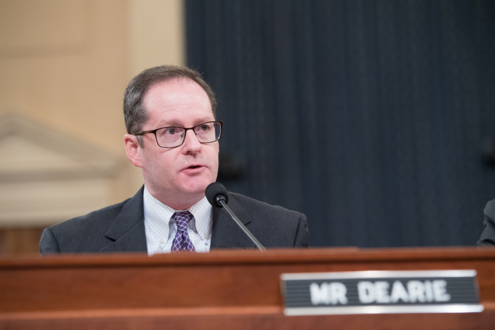 CAE president John Dearie testifies before the Joint Economic Committee, October 3, 2017.
CAE president John Dearie testifies before the Joint Economic Committee, October 3, 2017.
- June 22, 2018: CAE submits a letter of comment urging the Department of Homeland Security (DHS) to not terminate the International Entrepreneur (IE) parole program.
 Senator Jerry Moran (R-KS) chats with Blake Patton, CAE’s board chair, in October 24, 2017.
Senator Jerry Moran (R-KS) chats with Blake Patton, CAE’s board chair, in October 24, 2017.
- July 30, 2018: CAE submits a letter of comment to the National Institute of Standards and Technology (NIST) regarding reform of federal technology transfer processes.
- February 21, 2019: CAE establishes the Entrepreneurship Policy Group, a quarterly meeting of 18 organizations active on entrepreneurship-related issues. The purpose of the quarterly meeting is to share information regarding activities and initiatives, political reconnaissance, and to identify opportunities to coordinate and collaborate.
- March 6, 2019: CAE helps establish the first bipartisan Senate Entrepreneurship Caucus. The new Caucus is co-chaired by Senator Amy Klobuchar (D-MN) and Senator Tim Scott (R-SC).
- September 24, 2019: CAE hosts a Women’s Entrepreneurship Roundtable in Washington, DC with 22 women entrepreneurs from across the United States and members of the Senate Entrepreneurship Caucus.
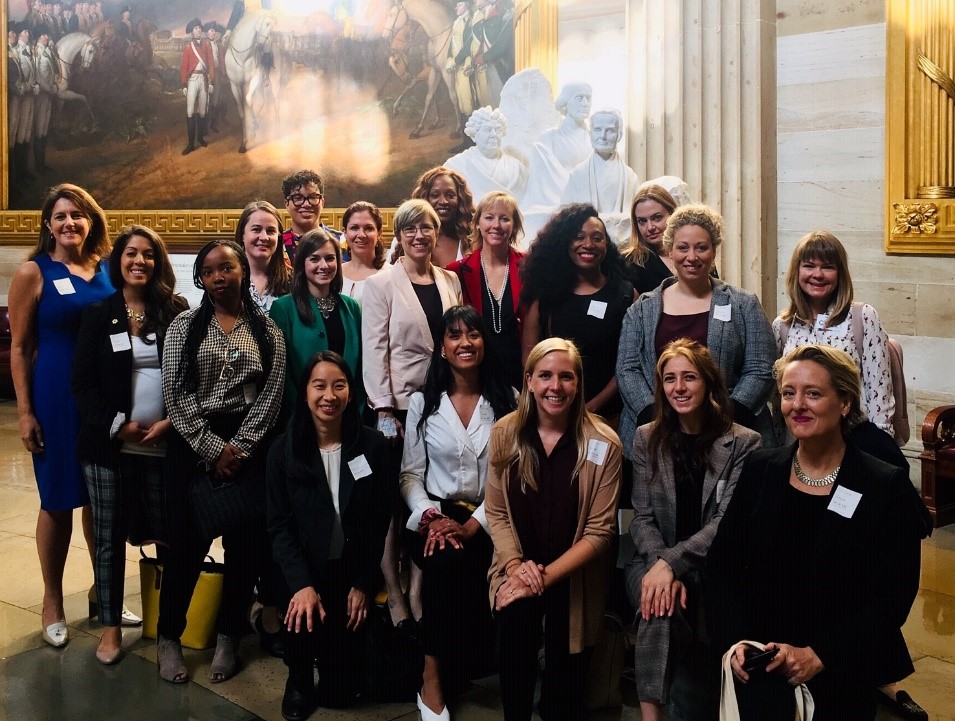 Women founders from all across the country pose before the monument to women’s suffrage pioneers Lucretia Mott, Elizabeth Cady Stanton, and Susan B. Anthony, in the Capitol Rotunda before a roundtable with the Senate Entrepreneurship Caucus, September 24, 2019.
Women founders from all across the country pose before the monument to women’s suffrage pioneers Lucretia Mott, Elizabeth Cady Stanton, and Susan B. Anthony, in the Capitol Rotunda before a roundtable with the Senate Entrepreneurship Caucus, September 24, 2019.
- September 24, 2019: Senate Entrepreneurship Caucus co-chairs Senator Amy Klobuchar (D-MN) and Senator Tim Scott (R-SC) introduce the Enhancing Entrepreneurship for the 21st Century Act, which directs the Secretary of Commerce to conduct a two-year analysis of the decline in new business formation rates, including likely contributing factors and economic implications.
 Senator Amy Klobuchar (D-MN), co-chair of the Senate Entrepreneurship Caucus, listens during a CAE-arranged roundtable with women entrepreneurs, September 24, 2019.
Senator Amy Klobuchar (D-MN), co-chair of the Senate Entrepreneurship Caucus, listens during a CAE-arranged roundtable with women entrepreneurs, September 24, 2019.
- October 2, 2019: CAE helps establish the bipartisan House Entrepreneurship Caucus. The new Caucus is co-chaired by Rep. French Hill (R-AR), Rep. David Schweikert (R-AZ), Rep. Steve Chabot (R-OH), Rep. Bill Foster (D-IL), Rep. Stephanie Murphy (D-FL), and Rep. Marc Veasey (D-TX).
- October 30, 2019: Senator Ron Wyden (D-OR), Ranking Member of the Senate Finance Committee, introduces the PROGRESS Act, which would improve startups’ access to capital by providing a first employee tax credit and a tax credit for angel investors.
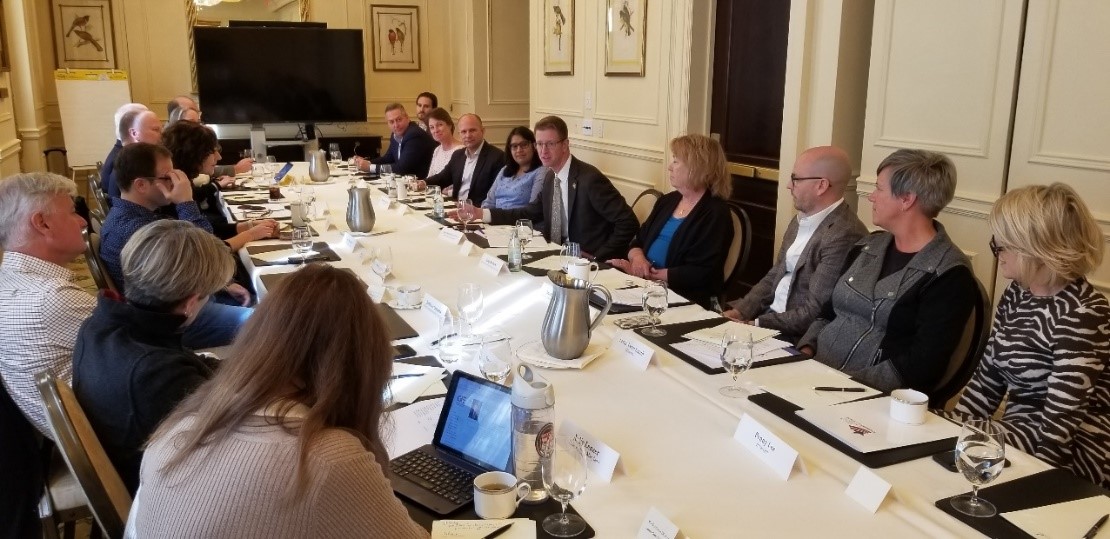 Members of CAE’s board of directors hear from Rep. Derek Kilmer (D-WA), Chairman of the House New Democrat Coalition, October 23, 2019.
Members of CAE’s board of directors hear from Rep. Derek Kilmer (D-WA), Chairman of the House New Democrat Coalition, October 23, 2019.
- February 5, 2020: CAE hosts a joint staff briefing of the House Entrepreneurship Caucus and the House R&D Caucus regarding implementation by Congress of the tech transfer and commercialization reform recommendations of the April 2019 “Green Paper” released by the National Institute of Standards and Technology (NIST).
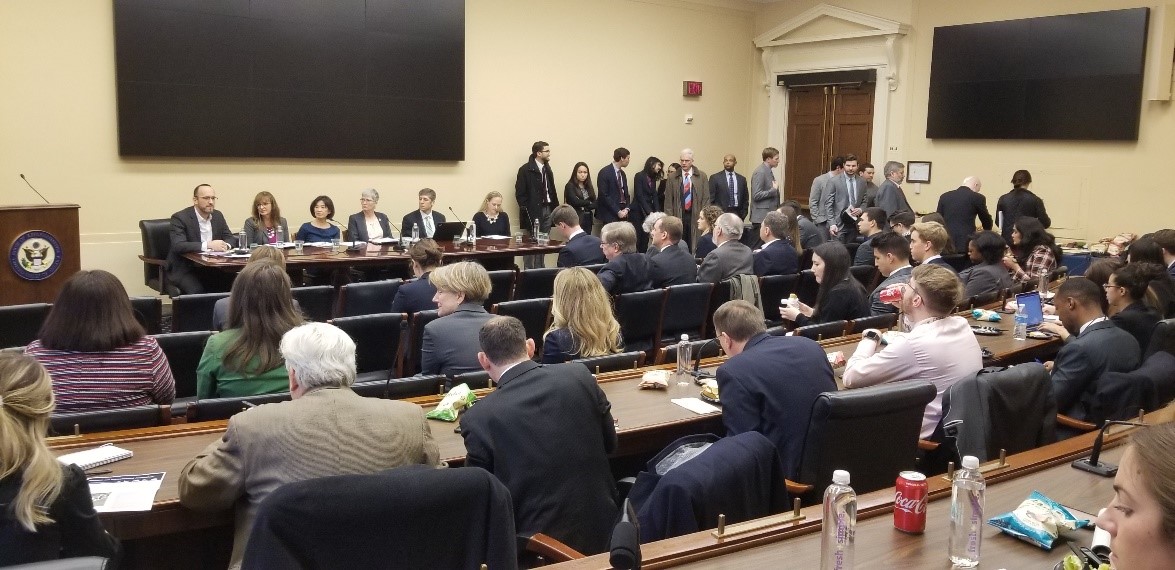 CAE board members Orin Herskowitz and Julie Lenzer (far left and second from left) lead a joint briefing of the House R&D Caucus and House Entrepreneurship Caucus.
CAE board members Orin Herskowitz and Julie Lenzer (far left and second from left) lead a joint briefing of the House R&D Caucus and House Entrepreneurship Caucus.
- March 18, 2020: The New Business Preservation Act is introduced in the Senate by Amy Klobuchar (D-MN), Chris Coons (D-DE), Tim Kaine (D-VA), and Angus King (I-ME). The bill would address the extreme concentration of venture capital (80 percent of which is raised and invested in San Francisco, New York, and Boston) by establishing a program at the Treasury Department to incentivize a more geographically diverse distribution of venture capital by offering a 1-to-1 match of federal dollars for every private dollar invested in startups, principally outside the three major venture capital centers.
- May 6, 2020: CAE organizes a letter from ten leading entrepreneurship, innovation, and small business organizations to Congressional leadership urging passage of the New Business Preservation Act.
- May 27, 2020: Senators Chuck Schumer (D-NY) and Todd Young (R-IN), along with Reps. Ro Khanna (D-CA) and Mike Gallagher (R-WI), introduce the Endless Frontier Act, intended to enhance the nation’s leadership position in science and technology. The Act would expand the National Science Foundation (NSF), to be renamed the National Science and Technology Foundation (NTSF); establish a new Technology Directorate within the NTSF; authorize $100 billion for the new directorate to reinvigorate American leadership in the discovery and application of ten key technology areas that will define global competitiveness; authorize an additional $10 billion for the Commerce Department to designate at least 10 regional technology hubs; and fund programs to accelerate the transfer of new technologies from the lab to the marketplace through entrepreneurship. The legislation – re-named the U.S. Innovation and Competition Act – was passed by the Senate on June 8, 2021 with a bipartisan vote of 68-32.
- August 5, 2020: Rep. Dean Phillips (D-MN) and Rep. Jackie Walorski (R-IN) introduce the IGNITE American Innovation Act. The Act would seek to get badly needed capital to startups struggling amid the Covid-19 crisis by amending the tax code to allow startups to “monetize” the tax assets on their balance sheets (principally net operating losses and R&D tax credits) up to $25 million.
- August 19, 2020: Senators Chris Coons (D-DE) and Richard Durbin (D-IL) introduce the Innovation Centers Acceleration Act, which, like the Endless Frontier Act, is intended to augment federal research and development and establish innovation and entrepreneurship centers across the United States.
- October 20, 2020: Senators Maggie Hassan (D-NH) and Todd Young (R-IN) introduce the American Innovation and Jobs Act. The Act would support research and development by startups by ensuring that companies can continue to fully deduct R&D expenses each year, raising the cap on the refundable R&D tax credit for small businesses and startups, and expanding eligibility for the refundable R&D tax credit.
- February 23, 2021: Senators Chris Coons (D-DE) and Tim Scott (R-SC), along with Representatives Jason Crow (D-CO) and Troy Balderson (R-OH),introduce the Next Generation Entrepreneurship Corps Act to encourage entrepreneurship and job creation in under-served communities through a new competitive entrepreneurship fellowship program. The Act would create a selection committee of 12 industry experts to review applications and select 320 entrepreneur fellows annually from diverse backgrounds to start both traditional and high growth-businesses in distressed or low-income census tracts. Selected fellows will be provided a $120,000 two-year stipend for living and basic startup expenses, healthcare coverage, interest-free deferral of federal student loans, immersive training, matching with a local business mentor, and support from an advisory board of CEOs and venture capitalists.
- February 25, 2021: Senator Chris Murphy (D-CT), Todd Young (R-IN), Kevin Cramer (R-ND), and Tim Kaine (D-VA), along with Rep. Scott Peters (D-CA), re-introduce the Workforce Mobility Act, which would ban the enforcement of noncompete agreements in all but the most necessary of circumstances.
- February 25, 2021: Senators Catherine Cortez Masto (D-NV) and Marsha Blackburn (R-TN) introduce the 21st Century Entrepreneurship Act, which will connect high-promise students in under-served areas to an entrepreneurship curriculum and Service Corps of Retired Executives (SCORE) mentors.
- February 25, 2021: The House Entrepreneurship Caucus is relaunched by Rep. French Hill (R-AR), Bill Foster (D-IL), Steve Chabot (R-OH), Stephanie Murphy (D-FL), David Schweikert (R-AZ), and Marc Veasey (D-TX).
- June 30, 2021: CAE president John Dearie testifies before the Innovation, Entrepreneurship, and Workforce Development Subcommittee of the House Small Business Committee regarding the importance of thriving entrepreneurship to the post-Covid economic recovery and job creation.
- June 30, 2021: Rep. Nydia M. Velázquez (D-NY), chair of the House Small Business Committee, introduces the Supporting America’s Young Entrepreneurs Act, which would address record student debt as an obstacle to entrepreneurship. The Act would provide three years of interest-free student loan deferment and up to $20,000 in forgiveness for founders who launch new businesses in economically distressed areas. Employees working at startups would also be able to access $15,000 in forgiveness regardless of their location. Under the terms of the legislation, the Internal Revenue Service would not consider debt forgiveness as taxable income. Additionally, the Act would create a new Young Entrepreneurs Business Center at the Small Business Administration. Co-sponsors include Rep. Judy Chu (D-CA), Rep. Dwight Evans (D-PA), Rep. Andy Kim (D-NJ), and Rep. Dean Phillips (D-MN).
- July 14, 2021: Senator Tim Scott (R-SC), co-chair of the Senate Entrepreneurship Caucus, and Senator Jeanne Shaheen (D-NH) introduce the Golden-preneurship Act, which will support entrepreneurship among American seniors by creating a federal program to provide capital, training, and mentors to 55+ entrepreneurs in communities across the country.
Publications
Entrepreneur Roundtables
To keep in close touch with America’s entrepreneurs and the issues, priorities, and challenges that matter most to them, CAE staff conducts regular roundtables with entrepreneurs in cities and towns across the United States. In our first 48 months, CAE staff has conducted 18 entrepreneur roundtables.
- Orlando, FL
- Seattle, WA
- Memphis, TN
- Ann Arbor, MI
- New York, NY
- Chicago, IL
- South Bend, IN
- Grand Rapids, MI
- Omaha, NE
- Durham, NC
- Raleigh, NC
- Richmond, VA
- Charlottesville, VA
- Madison WI
- El Paso, TX
- Tucson, AZ
- Detroit, MI
- Portland, OR
In addition to our standard entrepreneur roundtables, CAE also conducted a roundtable on July 28, 2020 with Detroit-based women entrepreneurs and Martha Miller, Director of the SEC’s Office of the Advocate for Small Business Capital Formation on access to capital challenges, and another on December 21, 2020 with SBIR-recipient entrepreneurs from across the country and senior staff at the Small Business Administration regarding ways to improve the SBIR program.
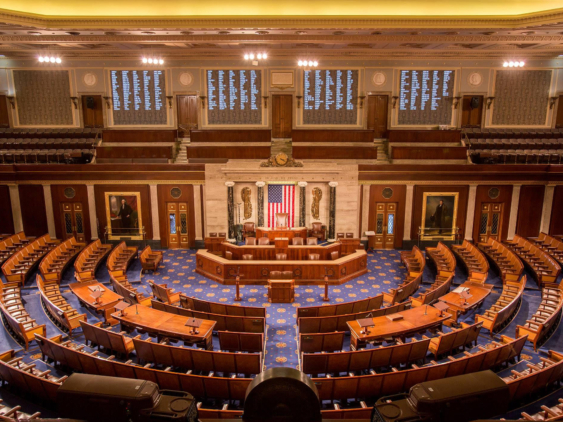
 CAE co-founder and board member, Ian Hathaway, presents with co-author, economist Richard Florida, at NYU Law School regarding their report “The Rise of the Global Startup City: The New Map of Entrepreneurship and Venture Capital,” October 5, 2018.
CAE co-founder and board member, Ian Hathaway, presents with co-author, economist Richard Florida, at NYU Law School regarding their report “The Rise of the Global Startup City: The New Map of Entrepreneurship and Venture Capital,” October 5, 2018. CAE president John Dearie testifies before the Joint Economic Committee, October 3, 2017.
CAE president John Dearie testifies before the Joint Economic Committee, October 3, 2017. Senator Jerry Moran (R-KS) chats with Blake Patton, CAE’s board chair, in October 24, 2017.
Senator Jerry Moran (R-KS) chats with Blake Patton, CAE’s board chair, in October 24, 2017. Women founders from all across the country pose before the monument to women’s suffrage pioneers Lucretia Mott, Elizabeth Cady Stanton, and Susan B. Anthony, in the Capitol Rotunda before a roundtable with the Senate Entrepreneurship Caucus, September 24, 2019.
Women founders from all across the country pose before the monument to women’s suffrage pioneers Lucretia Mott, Elizabeth Cady Stanton, and Susan B. Anthony, in the Capitol Rotunda before a roundtable with the Senate Entrepreneurship Caucus, September 24, 2019. Senator Amy Klobuchar (D-MN), co-chair of the Senate Entrepreneurship Caucus, listens during a CAE-arranged roundtable with women entrepreneurs, September 24, 2019.
Senator Amy Klobuchar (D-MN), co-chair of the Senate Entrepreneurship Caucus, listens during a CAE-arranged roundtable with women entrepreneurs, September 24, 2019. Members of CAE’s board of directors hear from Rep. Derek Kilmer (D-WA), Chairman of the House New Democrat Coalition, October 23, 2019.
Members of CAE’s board of directors hear from Rep. Derek Kilmer (D-WA), Chairman of the House New Democrat Coalition, October 23, 2019. CAE board members Orin Herskowitz and Julie Lenzer (far left and second from left) lead a joint briefing of the House R&D Caucus and House Entrepreneurship Caucus.
CAE board members Orin Herskowitz and Julie Lenzer (far left and second from left) lead a joint briefing of the House R&D Caucus and House Entrepreneurship Caucus.